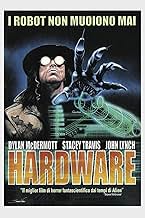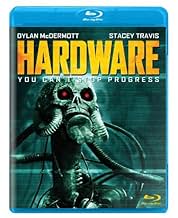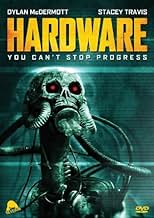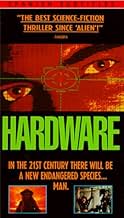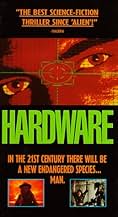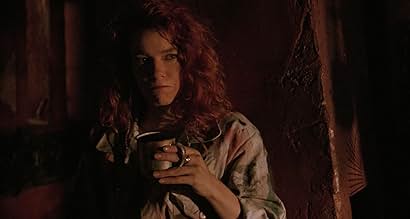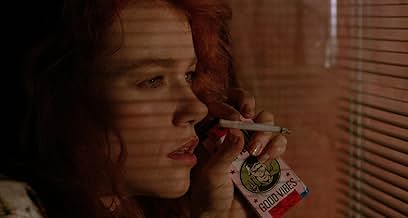The head of a cyborg reactivates, rebuilds itself, and goes on a violent rampage in a space marine's girlfriend's apartment.The head of a cyborg reactivates, rebuilds itself, and goes on a violent rampage in a space marine's girlfriend's apartment.The head of a cyborg reactivates, rebuilds itself, and goes on a violent rampage in a space marine's girlfriend's apartment.
- Awards
- 3 wins & 4 nominations total
Susie Savage
- Chinese Family
- (as Susie Ng)
Featured reviews
After all the horrible things I heard about this movie, I wasn't expecting much when I found it for $3 in a pawn shop... and, after watching it a couple of times, I don't know what the hell people who say this is "the worst movie in the world" were smoking... because this is one of the best low-budget sci-fi flicks I have ever come across.
Though it is by no means a sublime piece of art, I find the fact that the plot concerns one woman and her boyfriend fighting off this robot in her apartment, with the collapsing world as a backdrop around them to be somewhat refreshing in an age of sci-fi films trying to be epic and ending up trite. Though clumsily written at times and with the robot looking almost ridiculous at points, we get a nicely shot, stylishly lit sci-fi thriller that takes place on a human scale and whose premise has enough depth, symbolism and irony to make it all worthwhile. Best film I have ever seen? Hardly. But the best deal I've had for $3 in a very, very long time.
Though it is by no means a sublime piece of art, I find the fact that the plot concerns one woman and her boyfriend fighting off this robot in her apartment, with the collapsing world as a backdrop around them to be somewhat refreshing in an age of sci-fi films trying to be epic and ending up trite. Though clumsily written at times and with the robot looking almost ridiculous at points, we get a nicely shot, stylishly lit sci-fi thriller that takes place on a human scale and whose premise has enough depth, symbolism and irony to make it all worthwhile. Best film I have ever seen? Hardly. But the best deal I've had for $3 in a very, very long time.
Hardware is a quintessential cult film. Project of a young, troublesome director that was soon to vanish from the movie-making horizon. An ambitious but low budget science fiction that taps into a particular zeitgeist. An overwrought, philosophical flick that is fascinating even if it fails to deliver any real thrills.
Based on a short 2000 AD comic strip Shock!, Hardware is low on narrative content but it exploits its post-apocalyptic setting with a confidence and fidelity. Stanley manages to work around the budget restraints and turns all London based, indoor locations into a believably devastated landscape of a civilization in retreat. Flesh is consumed by overwhelming rusting metal and slowly decays amidst the ubiquitous pollution. It's a bleak even if not entirely original vision that here is pushed to the limit of being almost unpleasantly nihilistic.
Together with work of cyberpunk literature- Gibson's Neuromancer and some defining achievements of Japanese animé like Otomo's Akira (1988) and Fukutomi's Battle Angel Alita (1993) Stanley's film is a product of its times- anxious about the state of the environment and our place in the technological civilization on the threshold of the new millennium. It perhaps couldn't be made with the same infectious desperation pouring out of the screen at any other time in the history.
What it also shares with defining it literate and cinematic contexts is the same tendency towards gratuitous symbolism. Religious connotations (both Christian and Buddhist) between characters of Moses Baxter and deadly M.A.R.K.-13 are at times heavy handed but rewarding in the scale of the whole because of the consistency with which they are used and, at times, their detailed intricacy.
Exactly because philosophical rather than the narrative layer of Hardware comes to dominate the entire feature, Stanley's film becomes so dense, impenetrable and therefore intriguing. Film's colour palette, dominated by oligochromatic browns and reds adds to the overwhelming sense of endangerment even if the script, time and time again postpones the actual danger and fails to build up any tension. Added, voyeuristic sub-plot is appropriately disturbing and intense but serves little dramatic purpose.
Film delivers gore and sex, as expected but it's nowhere near as captivating or resonant as the overarching art style. In the last third, Stanley without any moderation delivers hypnotic and grotesque imagery that leaves the viewer confused but with a dominant sense of being a witness to a wonderful and bedazzling vision.
Verdict: Hardware is best approached not as it was advertised- a sci-fi action movie but rather a complex mantra; film of unified stylistic and philosophical vision that comes close to encapsulating both entertaining and intellectual properties of a masterful sci-fi. It is too aware of its real intentions too be fully appreciated by the mainstream audience but nevertheless remains a work of an intriguing and skillful director. If you fall for its depressing tone and appreciate cyberpunk influenced issues that it tackles you might find yourself coming back to it several times, despite its shortcomings.
Based on a short 2000 AD comic strip Shock!, Hardware is low on narrative content but it exploits its post-apocalyptic setting with a confidence and fidelity. Stanley manages to work around the budget restraints and turns all London based, indoor locations into a believably devastated landscape of a civilization in retreat. Flesh is consumed by overwhelming rusting metal and slowly decays amidst the ubiquitous pollution. It's a bleak even if not entirely original vision that here is pushed to the limit of being almost unpleasantly nihilistic.
Together with work of cyberpunk literature- Gibson's Neuromancer and some defining achievements of Japanese animé like Otomo's Akira (1988) and Fukutomi's Battle Angel Alita (1993) Stanley's film is a product of its times- anxious about the state of the environment and our place in the technological civilization on the threshold of the new millennium. It perhaps couldn't be made with the same infectious desperation pouring out of the screen at any other time in the history.
What it also shares with defining it literate and cinematic contexts is the same tendency towards gratuitous symbolism. Religious connotations (both Christian and Buddhist) between characters of Moses Baxter and deadly M.A.R.K.-13 are at times heavy handed but rewarding in the scale of the whole because of the consistency with which they are used and, at times, their detailed intricacy.
Exactly because philosophical rather than the narrative layer of Hardware comes to dominate the entire feature, Stanley's film becomes so dense, impenetrable and therefore intriguing. Film's colour palette, dominated by oligochromatic browns and reds adds to the overwhelming sense of endangerment even if the script, time and time again postpones the actual danger and fails to build up any tension. Added, voyeuristic sub-plot is appropriately disturbing and intense but serves little dramatic purpose.
Film delivers gore and sex, as expected but it's nowhere near as captivating or resonant as the overarching art style. In the last third, Stanley without any moderation delivers hypnotic and grotesque imagery that leaves the viewer confused but with a dominant sense of being a witness to a wonderful and bedazzling vision.
Verdict: Hardware is best approached not as it was advertised- a sci-fi action movie but rather a complex mantra; film of unified stylistic and philosophical vision that comes close to encapsulating both entertaining and intellectual properties of a masterful sci-fi. It is too aware of its real intentions too be fully appreciated by the mainstream audience but nevertheless remains a work of an intriguing and skillful director. If you fall for its depressing tone and appreciate cyberpunk influenced issues that it tackles you might find yourself coming back to it several times, despite its shortcomings.
I must admit I am a huge fan of this under-estimated, enigmatic South African director.
Like his magnificent masterpiece, Dust Devil, Hardware deals with similar themes - the desert, the Old Testament, and sexual violence.
I first saw this movie many years ago when still basically a kid before I went to film school and certain sequences have stayed with me forever.
Watching it again in 2005 the movie seems a little dated or rather post-rock video in places, but when it was made in 1990, this was all cutting-edge stuff. I am not giving anything away by saying that the plot is in many ways a re-working of The Terminator or Alien, when Dylan McDermott gives his girlfriend Jill (played by Stacey Travis)what he thinks is a load of unusual scrap metal salvaged from the desert. She is an artist and welds these robot parts to a sculpture she is making...
This is an extremely visceral movie, laced with religious iconography (mark-13 often adopts crucifixion poses and in the shower scene at the end, appears to be in a prayer position) and boosted by an extremely eclectic and unusual cast. Motorhead singer Lemmy crops up playing a sort of ferryman, Iggy Pop plays DJ Angry Bob, and John Lynch is excellent as my favourite character from this film, Shades.
The narrative is essentially straight-forward but what makes this movie different and memorable is Stanley's vision. The mise-en-scene is bleached red (post-appocalypse), the use of montage is often extremely effective and nightmarish and I was frequently reminded when watching it of Renaissence paintings, just in glimpses here and there (hell, maybe that's just me..!) There is also some American comment in this movie; mark-13 is adorned with a stars-and-stripes, and the deadly toxin it employs is described as 'smelling like apple pie'. This of course is akin to Dust Devil, where the demon is simply called 'Texas' by Wendy.
So, to conclude, if you haven't seen this movie or heard of this director before I urge you to seek him out. Anyone with a love for avant-garde and challenging cinema (like me) should have heard of this guy (proper auteur by the way) and his thematically-consistent visions.
This is still a fine film but probably hasn't aged as well as it might have done - it's strength is that it is far more complex than it first appears to be.
Like his magnificent masterpiece, Dust Devil, Hardware deals with similar themes - the desert, the Old Testament, and sexual violence.
I first saw this movie many years ago when still basically a kid before I went to film school and certain sequences have stayed with me forever.
Watching it again in 2005 the movie seems a little dated or rather post-rock video in places, but when it was made in 1990, this was all cutting-edge stuff. I am not giving anything away by saying that the plot is in many ways a re-working of The Terminator or Alien, when Dylan McDermott gives his girlfriend Jill (played by Stacey Travis)what he thinks is a load of unusual scrap metal salvaged from the desert. She is an artist and welds these robot parts to a sculpture she is making...
This is an extremely visceral movie, laced with religious iconography (mark-13 often adopts crucifixion poses and in the shower scene at the end, appears to be in a prayer position) and boosted by an extremely eclectic and unusual cast. Motorhead singer Lemmy crops up playing a sort of ferryman, Iggy Pop plays DJ Angry Bob, and John Lynch is excellent as my favourite character from this film, Shades.
The narrative is essentially straight-forward but what makes this movie different and memorable is Stanley's vision. The mise-en-scene is bleached red (post-appocalypse), the use of montage is often extremely effective and nightmarish and I was frequently reminded when watching it of Renaissence paintings, just in glimpses here and there (hell, maybe that's just me..!) There is also some American comment in this movie; mark-13 is adorned with a stars-and-stripes, and the deadly toxin it employs is described as 'smelling like apple pie'. This of course is akin to Dust Devil, where the demon is simply called 'Texas' by Wendy.
So, to conclude, if you haven't seen this movie or heard of this director before I urge you to seek him out. Anyone with a love for avant-garde and challenging cinema (like me) should have heard of this guy (proper auteur by the way) and his thematically-consistent visions.
This is still a fine film but probably hasn't aged as well as it might have done - it's strength is that it is far more complex than it first appears to be.
First off, let's get my bias out the way, I'm a die-hard fan of this movie, and this review is definitely intended to get the reader to give it a chance.
The film is riddled with industrial (music) culture references and cameos, and if you're into that scene, there's a certain sick thrill about seeing Carl McCoy as the zone trooper, and seeing footage of proto-industrial performance artist Monte Cazazza in this. The general tone and ambiance of the whole piece of wonderfully clichéd cyberpunk.
And that's really the interesting thing about this film. While there are a plethora of terrible sci-fi slasher flicks out there desperately claiming the 'cyberpunk' moniker, here is a film that claims to be nothing more than a sci-fi slasher flick, and manages to be somewhat of a pulp-cyberpunk classic instead.
The whole movie is a mood piece, designed more for its ambiance and the feel of its world, than particularly flashy action sequences or on-screen 'wow' factor. It's meant to be a genre movie, but it manages to feel like a 'serious' film under the influence of some heavy drugs. Not a bad thing really, but your tastes may disagree. Personally I've always liked that sunset-filtered-through pollution look that Bladerunner was infamous for, and hardware utilizes the same rather well.
Genre movie it may be, but it shows far less cheese coating and terrible acting than any of the current glut of genre movies being produced for the Sci-Fi channel. In fact the whole movie feels more like a good pulpy cyberpunk novella than a genre movie by far. Calling the movie 'mood music for rivetheads' isn't really an insult to it.
The film is riddled with industrial (music) culture references and cameos, and if you're into that scene, there's a certain sick thrill about seeing Carl McCoy as the zone trooper, and seeing footage of proto-industrial performance artist Monte Cazazza in this. The general tone and ambiance of the whole piece of wonderfully clichéd cyberpunk.
And that's really the interesting thing about this film. While there are a plethora of terrible sci-fi slasher flicks out there desperately claiming the 'cyberpunk' moniker, here is a film that claims to be nothing more than a sci-fi slasher flick, and manages to be somewhat of a pulp-cyberpunk classic instead.
The whole movie is a mood piece, designed more for its ambiance and the feel of its world, than particularly flashy action sequences or on-screen 'wow' factor. It's meant to be a genre movie, but it manages to feel like a 'serious' film under the influence of some heavy drugs. Not a bad thing really, but your tastes may disagree. Personally I've always liked that sunset-filtered-through pollution look that Bladerunner was infamous for, and hardware utilizes the same rather well.
Genre movie it may be, but it shows far less cheese coating and terrible acting than any of the current glut of genre movies being produced for the Sci-Fi channel. In fact the whole movie feels more like a good pulpy cyberpunk novella than a genre movie by far. Calling the movie 'mood music for rivetheads' isn't really an insult to it.
I saw this movie in the theater the week it opened way back when. It was a very, very late showing, and there were approximately five other people in the theater. Two walked out during the film. As the film credits rolled, the two women sitting next to us said, "My god! That was the worst film I have ever seen!" My only thoughts were, "They have not seen Starcrash!"
Both my friend and I loved Hardware. I introduced my SO to it this weekend, and he loved it. I think what I like about it is that it's a small movie that manages to execute its space perfectly. The universe of Hardware is dark, dirty, claustrophobic (without being small). The narrative is pure dystopia, which fits very well with the droid gone wild theme. The droid is so unrelenting, as is the dreariness of existence in this post apocalyptic space. I like how tight the movie is. I also like how clean the narrative is. There isn't any extraneous fluff.
I think this movie will appeal to the slightly more sophisticated film lover. It doesn't have big movie pretensions. Hollywood did not destroy this movie. The symbolism is far more subtle than in big productions. The pacing is also different. I loved the slow buildup.
This movie worked, but it's not an easy movie. If you're willing to work a little with a movie that doesn't have the big movie facade of Terminator II or Independence Day, and you enjoy dystopic science fiction, I think you will like this one.
Both my friend and I loved Hardware. I introduced my SO to it this weekend, and he loved it. I think what I like about it is that it's a small movie that manages to execute its space perfectly. The universe of Hardware is dark, dirty, claustrophobic (without being small). The narrative is pure dystopia, which fits very well with the droid gone wild theme. The droid is so unrelenting, as is the dreariness of existence in this post apocalyptic space. I like how tight the movie is. I also like how clean the narrative is. There isn't any extraneous fluff.
I think this movie will appeal to the slightly more sophisticated film lover. It doesn't have big movie pretensions. Hollywood did not destroy this movie. The symbolism is far more subtle than in big productions. The pacing is also different. I loved the slow buildup.
This movie worked, but it's not an easy movie. If you're willing to work a little with a movie that doesn't have the big movie facade of Terminator II or Independence Day, and you enjoy dystopic science fiction, I think you will like this one.
Did you know
- TriviaThe nomad who unearths the MARK-13 robot is played by Carl McCoy, lead singer of the goth rock band Fields of the Nephilim, for whom Richard Stanley had previously directed two music videos and designed an album cover. According to him, McCoy's character in "Hardware" is basically the same as it was in the Nephilim work. The character, then titled Preacher Man, had a prosthetic hand, yellow contact lenses and wore an old black coat with a cowboy hat.
- GoofsWhen the droid rebuilds itself, it picks up a circular saw. When it uses that circular saw as a weapon later, it is completely different design, with an all different cutting disk.
- Alternate versionsThe film was heavily cut to receive an M rating for its Australian theatrical run. The cuts were later restored for the R rated video release.
- ConnectionsEdited into Brave (1994)
- SoundtracksThe Order of Death
Written by John Lydon, Keith Levene and Martin Atkins
Performed by Public Image Ltd.
Published by EMI Songs Ltd/Virgin Music (Publishers) Ltd/Complete Music Ltd.
Details
- Release date
- Country of origin
- Languages
- Also known as
- M.A.R.K. 13 - Hardware
- Filming locations
- Production companies
- See more company credits at IMDbPro
Box office
- Budget
- $1,500,000 (estimated)
- Gross US & Canada
- $5,728,953
- Opening weekend US & Canada
- $2,381,285
- Sep 16, 1990
- Gross worldwide
- $5,729,735
- Runtime
- 1h 34m(94 min)
- Color
- Sound mix
- Aspect ratio
- 1.85 : 1
Contribute to this page
Suggest an edit or add missing content


